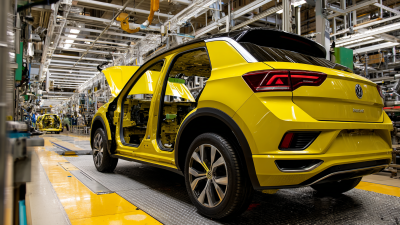Leave Your Message
In recent years, the secondhand car market has experienced significant growth, driven by savvy buyers seeking value in their purchases. According to a report by Edmunds, used car sales in the U.S. reached 40.5 million in 2021, with a notable increase of approximately 10% from the previous year. This trend highlights the financial advantages of investing in secondhand vehicles, including reduced depreciation costs and a wider selection within various price ranges. With the average new car depreciating roughly 20% in its first year, secondhand cars offer a practical solution for budget-conscious consumers. By employing strategic approaches such as thorough research, negotiation tactics, and understanding market trends, buyers can maximize the value they receive from their secondhand car purchases, ensuring a wise investment in a competitive marketplace.

When it comes to purchasing a vehicle, savvy buyers are increasingly turning to secondhand cars. One of the primary benefits of choosing a used car over a new model is depreciation. According to a report by Edmunds, new cars can lose up to 20% of their value within the first year of ownership. In contrast, the majority of depreciation has already occurred by the time a car is sold as used, meaning buyers can get more value for their money.
Moreover, secondhand cars typically come with lower insurance costs. As highlighted by the Insurance Institute for Highway Safety, the insurance premiums for used vehicles can be significantly less than those for new ones, providing another layer of financial relief for buyers. This cost-saving advantage allows people to invest more in maintenance and care for their vehicles, ultimately extending their lifespan.
**Tip:** When considering a secondhand car, be sure to check its history report to avoid any hidden issues. Tools like Carfax and AutoCheck can provide crucial information about previous ownership and accident history.
**Tip:** Always compare prices across multiple platforms to ensure you're getting the best deal. Websites like Kelley Blue Book or TrueCar can guide you on what constitutes a fair market price for the model you’re interested in.
| Advantage | Description | Potential Savings (%) | Depreciation Rate (Year 1) |
|---|---|---|---|
| Lower Initial Cost | Secondhand cars can be significantly cheaper than new cars. | 15-30% | -20% |
| Lower Insurance Premiums | Insurance costs are generally lower for used cars. | 10-25% | N/A |
| Established Reliability | Older models may have a proven track record for reliability. | N/A | N/A |
| More Choices | A wider variety of car models and types are available. | N/A | N/A |
| No Dealer Markups | Purchasing secondhand can avoid dealership fees and markups. | 5-15% | N/A |
When considering the purchase of a used vehicle, several key factors can significantly influence your decision and help you maximize value. First, assess the vehicle's age and mileage; generally, newer models with lower mileage command higher resale values. However, vehicles that have been well-maintained can also be excellent choices even if they are slightly older. It's essential to review the car's history report, which can provide insights into previous accidents, service records, and ownership history.
Another critical factor is the selling platform. In recent trends, over 90% of sellers have turned to online platforms to reach buyers, resulting in a more competitive market. Leading websites have made it easier to compare prices and vehicle conditions; therefore, consider exploring various online marketplaces for the best deals.
Lastly, focus on the specifics of the vehicle type you are interested in, whether it be hatchbacks, sedans, or SUVs. Each type offers different advantages in terms of fuel efficiency, storage space, and resale value. Researching how these factors align with your needs will ultimately guide you to a purchase that is not only budget-friendly but also suits your lifestyle.
When diving into the secondhand car market, thorough inspection and evaluation are crucial for making a savvy purchase. Start by examining the vehicle's exterior for any signs of damage or rust. Look closely at the paint job; mismatched colors can indicate previous repairs. Pay attention to the car’s tires as well; uneven wear may suggest alignment issues. Checking for signs of leaks or corrosion under the hood can help identify potential mechanical problems before committing to a purchase.
Once you’ve assessed the exterior, it's essential to evaluate the car's interior features. Ensure all electronics work properly, including lights, windows, and infotainment systems. Don’t forget to check the odometer; a suspiciously low mileage on an older model can be a red flag. Additionally, take the vehicle for a test drive, listening for any unusual sounds and observing how the car handles. This experience is invaluable in understanding the car's performance and overall comfort, allowing you to make an informed decision and truly maximize the value of your secondhand car investment.

When it comes to purchasing a secondhand car, effective negotiation strategies can significantly enhance your buying experience and ensure you get the best price. Firstly, do your homework before entering negotiations. Research the market value of the car you’re interested in to have a solid understanding of its worth. Websites that track car sales can provide insight into fair pricing. Armed with this information, you can confidently establish a price range and create a compelling argument for your offer.

Secondly, approach the negotiation with confidence and an open mind. Start by making a reasonable offer based on your research, emphasizing any flaws or maintenance needed in the car to justify your lower price. Use silence to your advantage; after stating your offer, give the seller time to respond. Often, they may feel compelled to fill the quiet with a counteroffer or additional concessions.
Lastly, be prepared to walk away if the terms don’t meet your expectations. This tactic can compel sellers to reconsider their offer and may lead to a better deal.
When purchasing secondhand vehicles, finding reliable sources is crucial for savvy buyers looking to maximize value. As the market for secondhand cars continues to flourish globally, particularly in regions like Zhejiang, where exports have surged significantly this year, buyers can benefit from a wealth of opportunities.
Tips: Always verify the vehicle's history through trusted services that provide comprehensive reports. This not only gives you insight into previous ownership and maintenance but also helps identify any hidden issues. Look for dealerships or platforms that offer guarantees or return policies, which can provide peace of mind, especially when navigating the secondhand market.
Another valuable strategy is to leverage online platforms that specialize in secondhand vehicles. These platforms often have user reviews and ratings that can help you gauge the reliability of the sellers. Additionally, attending local car fairs or auctions can be a great way to connect directly with sellers and negotiate better deals, ensuring you get the best value for your investment.






